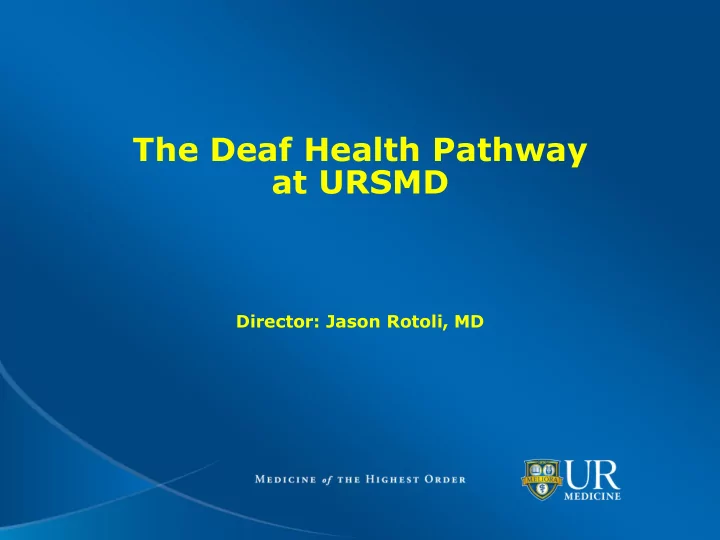

The Deaf Health Pathway at URSMD Director: Jason Rotoli, MD
The Deaf Community Rochester Deaf in the Rochester Area • ~5,000 adults • Highest per capita in America Deaf Community is socially and medically marginalized • Little awareness by health providers • Few sources of accessible health information • Low literacy • Low health literacy • Inclusion in national datasets is unclear (linguistic exclusion)
The Deaf Health Pathway: Goals • Appreciate the health disparities between the Deaf community and the general population • Increase awareness of unique Deaf health needs within a medical system • Introduce successful community engagement strategies • Increase knowledge of resources available to Deaf patients • Provide opportunities for linguistic and cultural immersion • Prepare students to care for Deaf patients (and other minority groups)
Why You Should Join the DHP Culture Competency & Language Immersion • Cultural awareness of Deaf Community • History, Conflicts, Achievements, Challenges • American Sign Language • Linguistic conduit into cultural appreciation • Learn a new language (or improve your fluency) Care for underserved population • Develop skills that can be applied to other minority populations Become a community health advocate • Work with Deaf organizations on a variety of health issues
Years 1 & 2 Medical Humanities Seminar Series: Three Parts Deaf Health, Part 1 An Introduction to Deaf Language and Culture Seminar in Spring of 1st Year Deaf Health, Part 2 Immersion into Deaf Language and Culture Seminar in Fall of 2nd Year Deaf Health, Part 3 Medical Experience in Deaf Language and Culture Seminar in Spring of 2nd Year Completion of all 3 seminars is necessary to enroll in the Pathway Each Part is 2 hours weekly (1pm – 3pm) for 8 weeks
Years 3 & 4: DHP Elective • Four weeks (total); can be split (2+2) if needed • Focus on issues relating to disparities in Deaf health • Provides and experience in collaboration and interaction with the Deaf community • Focus on single domain or combination of several domains • New project or build on previous work • May work independently or in collaboration with other DHP students
Deaf Health Pathway: Project Elements Community Involvement • Partnership with Deaf organizations (e.g. projects, health education programs, community service) Research Project • Supervised by a faculty member • Community Education (Deaf Health Talks) • Develop and implement an educational healthcare module for a specific medical condition or circumstance relating to the Deaf population Interpreting Observership • Coordinated with URMC Department of Interpreting Services
Year 3 & 4: Elective Domains Clinical Experience • Work with physicians who treat Deaf patients • Develop clinical and cultural skills and knowledge about interactions with Deaf patients Supervised Community-based Project • 10 – 15 pages or equivalent OR Presentation & Summary • Build on work done in Deaf electives • Submitted by February 1 of final year Medical Sign Workshop (optional) • Provide more in-depth communication approaches in ASL • Schedule two meetings with DHP director for medical case based ASL instruction
DHP Elective Deliverables Proposal & Calendar • Identify a Mentor • Each student can identify a community or health mentor to meet regularly or use the director as their mentor for the project • Submit a Project Proposal to Dr. Rotoli and Tressa Newton 8 weeks prior to start of elective • Should include: • Schedule with completion dates • Goals/Objectives • Contacts • Required resources (administrative support, materials, etc)
DHP Elective Deliverables Final Report or Project • Content will depend on nature of elective--agreed upon at start of elective • Due by February 1 st of Year 4
What will continue? ASL Classes and Training Field Trips • Rochester School for the Deaf • National Technical Institute for the Deaf • National Center for Deaf Health Research Precepting Opportunities at Various Health Settings • Deaf Friendly Clinics • Audiology • ENT Surgery • Health Clinic at RIT • URMC Urgent Care • SMH Interpreting
Silent Dinners In addition to Year 1/2 Seminars and Year 3/4 elective, DHP students will have the option to participate in “ Silent Dinners ” * • Monthly “voice - off” meals • Subsidized dinners in various settings • home, restaurant, community center, etc. • Interaction with members of the Deaf Community • Develop linguistic and cultural proficiency through environmental immersion • Expected participation of >50% of events * Developed in 2013 in response to student feedback
What’s NEW this year? ASL/Deaf Culture Club at URSMD • Proposed by Alcina Lidder, URSMD medical student • Allow students to learn/practice ASL • Notification to attend Deaf community events • Practice ASL skills outside of the Deaf Health Seminars Note: students who are unable to commit to the requirements of the Deaf Health Pathway and/or are pursuing a different pathway welcome
Deaf Health Pathway Certification Those who complete all elements of the Deaf Health Pathway prior to graduation will be recognized in several ways: 1. Provision of certificate upon graduation 2. Dean’s Letter 3. Transcripts Also: Skills you develop during your elective Residency Interviews – Diversity Milestone Curriculum Vitae
Interested? Please enroll in the Deaf Health Seminars when requested by the Medical Humanities Office. Students will be required to complete all 3 seminars to enroll in the Deaf Health Pathway. Contact the DHP Director: Jason Rotoli, MD Department of Emergency Medicine Jason_Rotoli@urmc.rochester.edu Contact the DHP Coordinator: Tressa Newton Office of Curriculum & Assessment Tressa_Newton@urmc.rochester.edu Deaf Health Pathway Website http://www.urmc.rochester.edu/education/md/admissions/elective-pathway.aspx
Recommend
More recommend